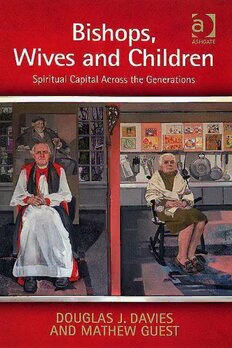
Bishops, Wives and Children PDF
220 Pages·2007·1.223 MB·English
Most books are stored in the elastic cloud where traffic is expensive. For this reason, we have a limit on daily download.
Preview Bishops, Wives and Children
Description:
Arguments for or against the decline of Christianity as a cultural force to be reckoned with have rarely taken into account the actual processes by which tradition is transmitted, modified, embraced or rejected over time. This book sheds new light on the significance of Christianity in late modern Britain through a study of the families of Christian leaders and the transmission of Christian values. Furnishing a picture of how values fostered in the clerical home are passed on to the next generation, shaping the way in which family, work, civic service and religion are lived out in adult life, this study facilitates a broader discussion of how, in our supposedly secular age, the Christian church exerts an indirect influence upon British culture - not just through its leaders - but through the lives and work of their children. Addressing the dual question of how religious leaders influence their children, and how their children influence society, the authors draw on new primary research into the experiences, beliefs and values of Anglican bishops, their wives and their adult offspring. Davies and Guest adopt qualitative methods to achieve a complex image of the clergyman as a professional whose role has been radically reshaped due to pressures from within the church and from secular society. In drawing in leaders whose influence on society has been radical and far-reaching, they present unique insights into how clergy achieve social power in an age incredulous to ecclesiastical hierarchy. "Bishops, Wives and Children" marks an important advance in the analysis of the social significance of Christian tradition and all it represents in wider British society.
See more
The list of books you might like
Most books are stored in the elastic cloud where traffic is expensive. For this reason, we have a limit on daily download.
